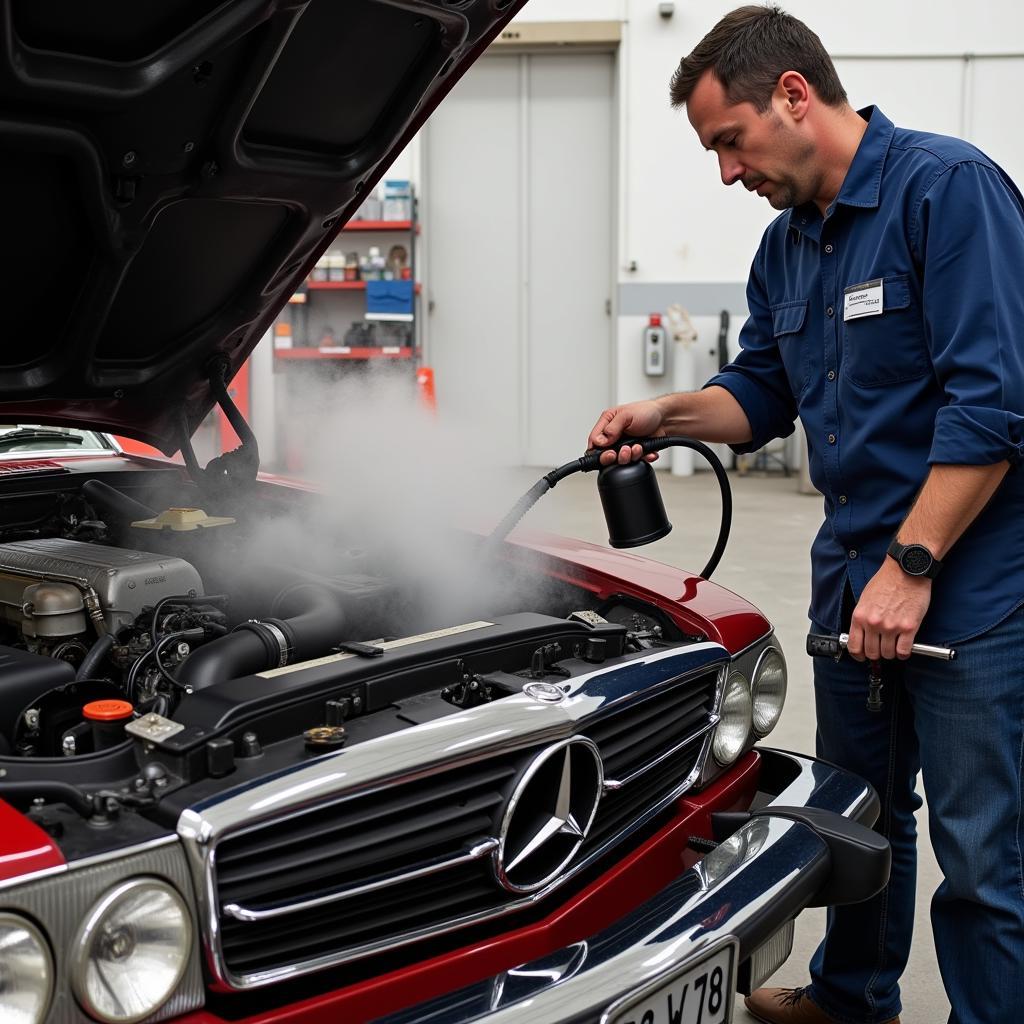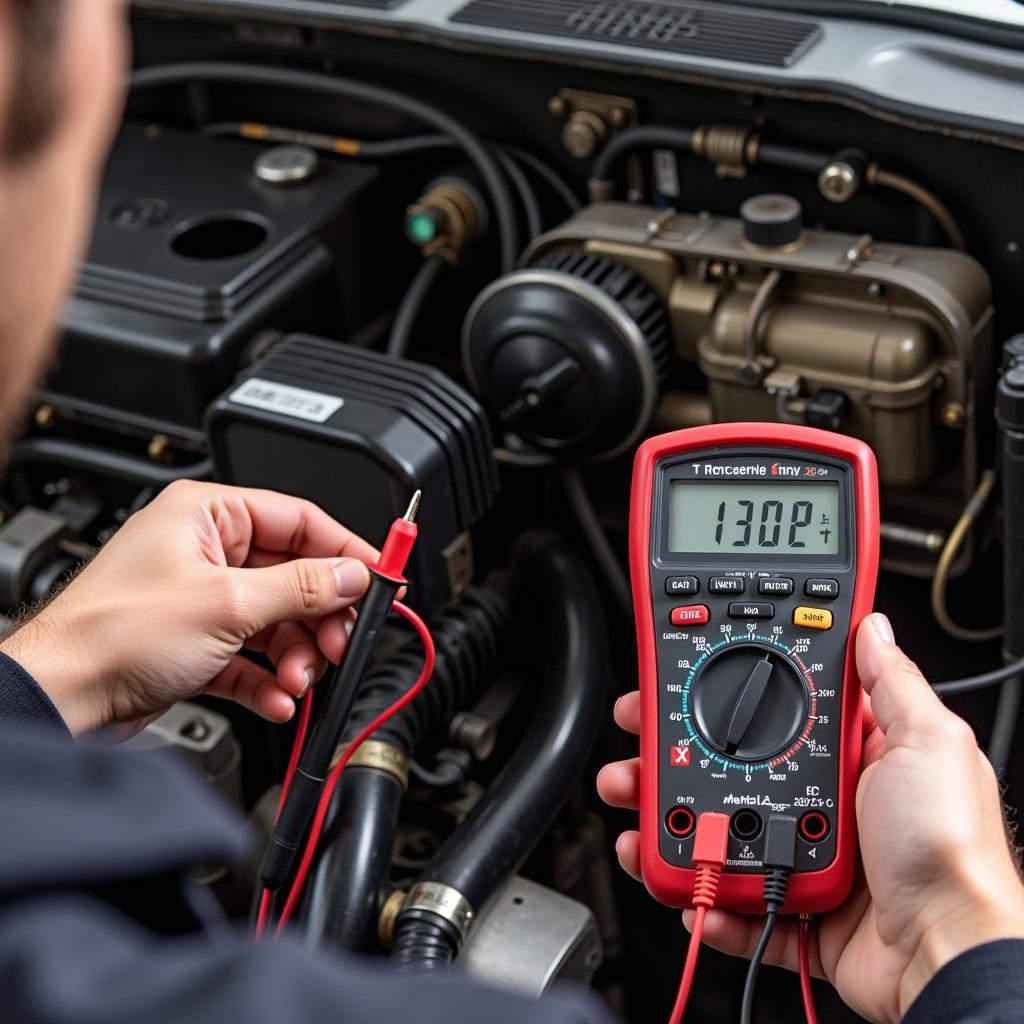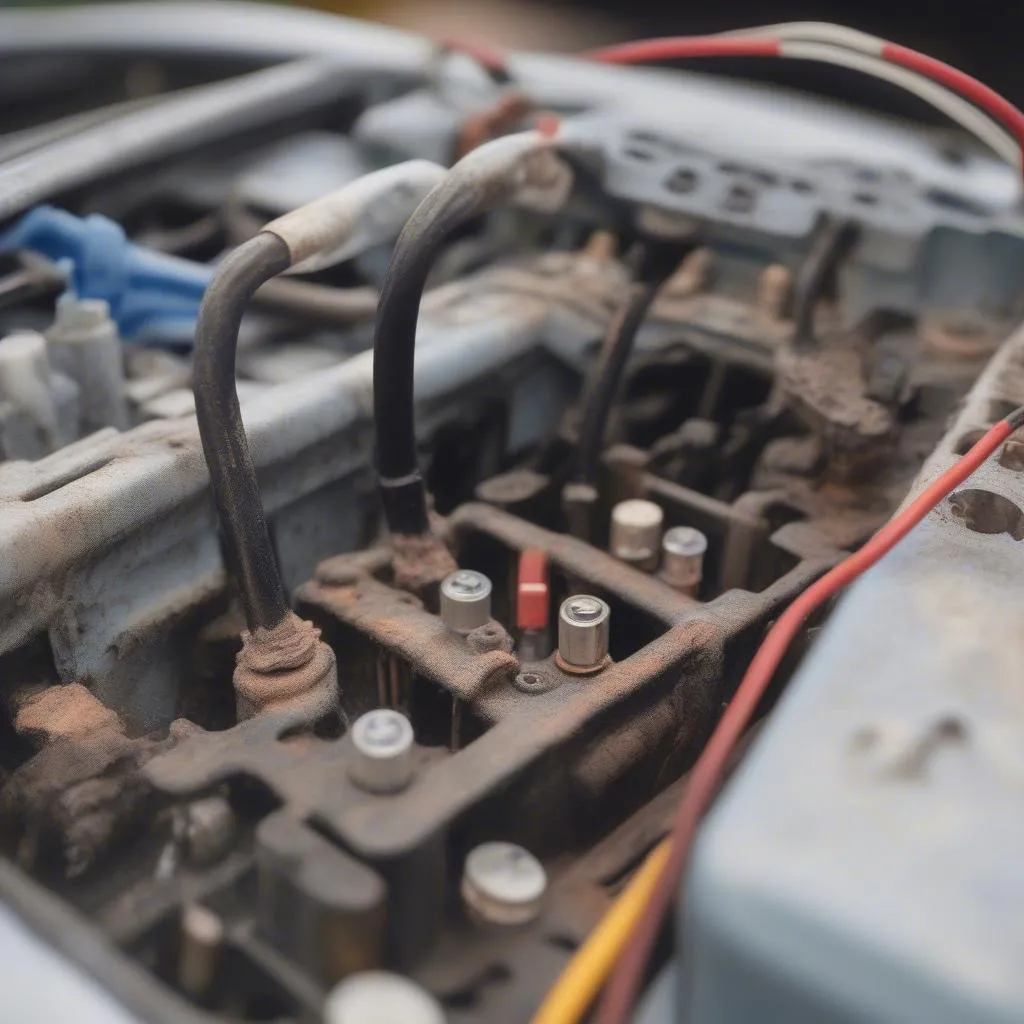If your 1984 Mercedes 380SL is running rich, meaning it’s using too much fuel, it can lead to poor performance, decreased fuel economy, and even damage to your catalytic converter. This issue can be frustrating, but with a systematic approach, you can pinpoint the culprit and get your classic Mercedes purring smoothly again. This article will guide you through the common causes of a rich fuel mixture in your 380SL and provide practical solutions to fix the problem.
Understanding a Rich Fuel Mixture in Your Mercedes 380SL
A rich fuel mixture occurs when the air-fuel ratio is imbalanced, with too much fuel compared to air. This can stem from a variety of issues, from faulty sensors to mechanical problems. Identifying the root cause is crucial for effective repair. A properly running 380SL should have a precise air-fuel ratio for optimal performance and fuel efficiency.
Common Causes of a Rich Fuel Mixture
Several components can contribute to a rich running condition in your 1984 Mercedes 380SL. Here are some of the most common culprits:
- Oxygen Sensor (O2 Sensor): A failing O2 sensor can provide inaccurate readings to the engine control unit (ECU), leading to an incorrect fuel mixture.
- Fuel Pressure Regulator: A malfunctioning fuel pressure regulator can cause excessive fuel pressure, resulting in a rich mixture.
- Coolant Temperature Sensor (CTS): A faulty CTS can trick the ECU into thinking the engine is cold, leading to a richer mixture during warm-up that persists even when the engine reaches operating temperature.
- Air Flow Meter (AFM): The AFM measures the amount of air entering the engine. If it’s faulty, it can provide incorrect data to the ECU, resulting in an improper fuel mixture.
- Fuel Injectors: Leaky or clogged fuel injectors can disrupt the fuel spray pattern and cause a rich condition.
- Vacuum Leaks: Vacuum leaks can introduce unmetered air into the engine, disrupting the air-fuel ratio and causing a rich mixture.
How to Fix a Rich Fuel Mixture in your Mercedes 380SL (1984)
Diagnosing and fixing a rich fuel mixture requires a systematic approach. Here’s a step-by-step guide:
- Check for Diagnostic Trouble Codes (DTCs): Use a diagnostic tool to read any stored DTCs. These codes can provide valuable clues about the source of the problem.
- Inspect the Oxygen Sensor: Test the O2 sensor’s voltage output using a multimeter. A failing sensor will have erratic or slow voltage changes.
- Test the Fuel Pressure Regulator: Check the fuel pressure using a fuel pressure gauge. Compare the readings to the manufacturer’s specifications.
- Examine the Coolant Temperature Sensor: Test the CTS resistance using a multimeter. Compare the readings to the manufacturer’s specifications.
- Inspect the Air Flow Meter: Check the AFM for any visible damage or contamination. Test its output voltage using a multimeter.
- Check for Vacuum Leaks: Use a vacuum gauge to check for leaks in the intake manifold and vacuum hoses. Alternatively, you can use a smoke test to pinpoint leaks.
- Inspect Fuel Injectors: Check the fuel injectors for leaks or clogs. You may need to have them professionally cleaned or replaced.
Remember, safety is paramount. Always disconnect the battery before working on any electrical components.
Why is my Mercedes 380SL running rich?
Your 1984 Mercedes 380SL could be running rich due to several factors, including a faulty oxygen sensor, fuel pressure regulator, coolant temperature sensor, air flow meter, leaky fuel injectors, or vacuum leaks.
 Testing for vacuum leaks on a Mercedes 380SL
Testing for vacuum leaks on a Mercedes 380SL
How do I know if my Mercedes is running too rich?
Signs of a rich fuel mixture include a strong fuel smell, black smoke from the exhaust, poor fuel economy, rough idling, and decreased engine performance.
“A systematic approach is crucial when diagnosing a rich fuel mixture. Start by checking for diagnostic trouble codes and then systematically inspect the key components,” says Jake Peterson, a veteran automotive technician with over 20 years of experience.
Can a bad O2 sensor cause a rich fuel mixture?
Yes, a faulty oxygen sensor can absolutely cause a rich fuel mixture. The O2 sensor provides crucial information to the ECU, and inaccurate readings can lead to an improper air-fuel ratio.
 Testing the oxygen sensor on a Mercedes 380SL
Testing the oxygen sensor on a Mercedes 380SL
Conclusion
Fixing a rich fuel mixture in your 1984 Mercedes 380SL requires careful diagnosis and repair. By following the steps outlined in this guide, you can identify the root cause of the problem and restore your classic car to optimal performance. Remember, addressing this issue promptly not only improves fuel economy but also protects your engine from potential damage. Don’t hesitate to consult a qualified mechanic if you encounter any difficulties during the diagnostic or repair process.
FAQ
- What are the symptoms of a rich fuel mixture? Symptoms include a strong fuel odor, black smoke from the exhaust, reduced fuel efficiency, and rough idling.
- Can I drive my car if it’s running rich? While you can drive a short distance, it’s not recommended as it can damage your catalytic converter and other engine components.
- How much does it cost to fix a rich fuel mixture? The cost depends on the underlying cause and can range from a few dollars for a new sensor to several hundred for more complex repairs.
- How often should I check my fuel system? It’s a good practice to have your fuel system inspected during regular maintenance checks.
- What tools do I need to diagnose a rich fuel mixture? You’ll need a diagnostic tool, multimeter, fuel pressure gauge, and potentially a vacuum gauge or smoke machine.
- Can a dirty air filter cause a rich mixture? While a dirty air filter can cause other issues, it typically leads to a lean mixture, not a rich one.
- Is it difficult to replace an oxygen sensor myself? Replacing an O2 sensor is a relatively straightforward task, but it’s important to use the correct tools and procedures.
Related Articles on CARDIAGTECH
- Troubleshooting Fuel System Issues in Classic Mercedes
- Understanding Your Mercedes 380SL Engine Management System
- DIY Car Maintenance Tips for Beginners
Need help? Contact us via Whatsapp: +1 (641) 206-8880, Email: CARDIAGTECH[email protected] or visit us at 276 Reock St, City of Orange, NJ 07050, United States. We have a 24/7 customer support team.

